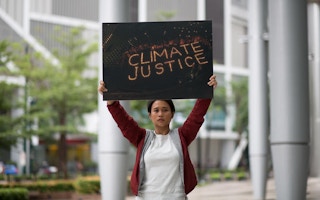Asian governments and industries have increasingly been facing legal action for climate change-related harms over the past two years, a report by a United States-headquartered law firm has revealed.
From 2018 to 2020, there has been an 185 per cent increase in the number of climate lawsuits in Asia, according to figures from a study by White & Case, which examined the rise in global disputes, with some 600 new cases filed all over the world over the same period.
Titled Climate change disputes: Sustainability demands fuelling legal risk, the research showed how there are now 20 climate lawsuits filed across the Philippines, South Korea, Japan, India, Indonesia and Pakistan.
As for countries like China, Malaysia, Singapore, Thailand and Vietnam, no climate lawsuits have been recorded yet.
Australia is by far the most active country in Asia Pacific for climate ligitation, with 116 cases, while Western economies like the United States (865 cases) and Europe (125 cases) are similarly active. But the rise in climate litigation elsewhere in Asia shows that there is “a growing perception that governments in the region aren’t taking sufficiently robust action to reduce greenhouse gas emissions,” said Tim Power, environmental lawyer of White & Case.
“Many climate change advocates and activists [in Asia] are starting to pursue climate change litigation to put pressure on governments and businesses to change their behaviour by adopting more climate-friendly policies and practices,” Power told Eco-Business.
Hover over chart below to see number of climate lawsuits in Asia in 2018, compared to 2020:
The Philippines filed the world’s first national enquiry framing climate change as a human rights issue in 2015.
Typhoon survivors in the natural disaster-prone country petitioned the Philippines’ National Commission on Human Rights to investigate 47 companies, including ExxonMobil, Shell and BP, for perpetuating human rights violations by contributing to climate change.
After a four year investigation, the commission announced that the biggest global carbon polluters could be held liable for their role in climate-related events in the country and their early knowledge of those impacts.
“
The rise in climate litigation in Asia shows that there is a growing perception that governments in the region aren’t taking sufficiently robust action to reduce greenhouse gas emissions.
Tim Power, environmental lawyer, White & Case
South Korean youth activists also used violations of constitutional rights to sue the government, claiming that the nation’s climate change law does not go far enough to protect their future.
The students argued that their fundamental rights, including the right to live in a clean environment, have been infringed by the nation’s climate change law, which they say fails to set specific targets to prevent global temperatures from rising.
Similarly, a coalition of women in Pakistan filed a case against the government, claiming its inaction on climate change violated their rights to equal protection under the law, on grounds that natural disasters had disproportionately more impact on women and girls.
Other lawsuits in Asia included those filed by Japanese citizens to block the construction of new coal-fired power plants in their communities, much like Indonesia’s lone case where Bali residents challenged coal expansion in their area. India’s disputes were pre-dominantly about protection of forests and guarding against flood-prone areas.
Little legal action on climate cases in Asia: A misnomer?
It is a “misnomer” to say that disputes related to climate change are less common in Asia compared to the US and Europe, argued an environmental lawyer of multi-lateral lender Asian Development Bank (ADB).
Christina Pak, lead author of an ADB report on climate litigation in Asia and the Pacific released on December 2020, cited “definitional challenges” as a roadblock to why the region’s cases have not had a higher profile globally.
“Global institutions limit climate litigation to cases that raise climate change as a central issue. But our study gave a broader definition of climate change lawsuits to even include cases which do not explicitly raise climate change, but have consequences of its mitigation or adaptation efforts,” said Pak, principal counsel and team leader of the law and policy reform of ADB.
For instance, cases that recognise intergenerational responsibility for the environment are not identified as climate change disputes internationally, but the ADB study classified it as such, citing the landmark Philippine case of Oposa v. Factoran.
“
ADB’s study gave a broader definition of climate change lawsuits to even include cases which do not explicitly raise climate change, but have consequences of its mitigation or adaptation efforts.
Christina Pak, principal counsel, Asian Development Bank
In the early 1990s, lawyer Antonio Oposa Jr. acted as counsel for 43 children in a class suit against then environment and natural resources secretary Fulgencio Factoran.
At that time, there were only 800,000 hectares of virgin forest left in the Philippines, but the government granted timber license agreements to various corporations to cut down over 3.9 million hectares.
In a widely-acclaimed case on intergenerational responsibility, the Philippine Supreme Court upheld the legal standing and the right of children to initiate the action on their behalf and on behalf of generations yet unborn.
Such cases show that some of the bedrock principles used in climate litigation globally find their provenance in Asia, Pak told Eco-Business.
The Oposa case went on to become a precedent for Juliana v. United States in 2015, where young people filed a climate lawsuit against the government for failing to limit the effects of climate change.
The same principle of intergenerational equity was used in Sacchi et al. v. Argentina et al in 2019. Children filed a petition against governments who failed to make sufficient cuts to greenhouse gases, claiming their rights under the UN Convention on the Rights of the Child had been violated.
“On this basis, Asia is a rich source of jurisprudence on climate change. Climate litigation in the region is not less common or less frequent as compared with the rest of the world,” she said.

















